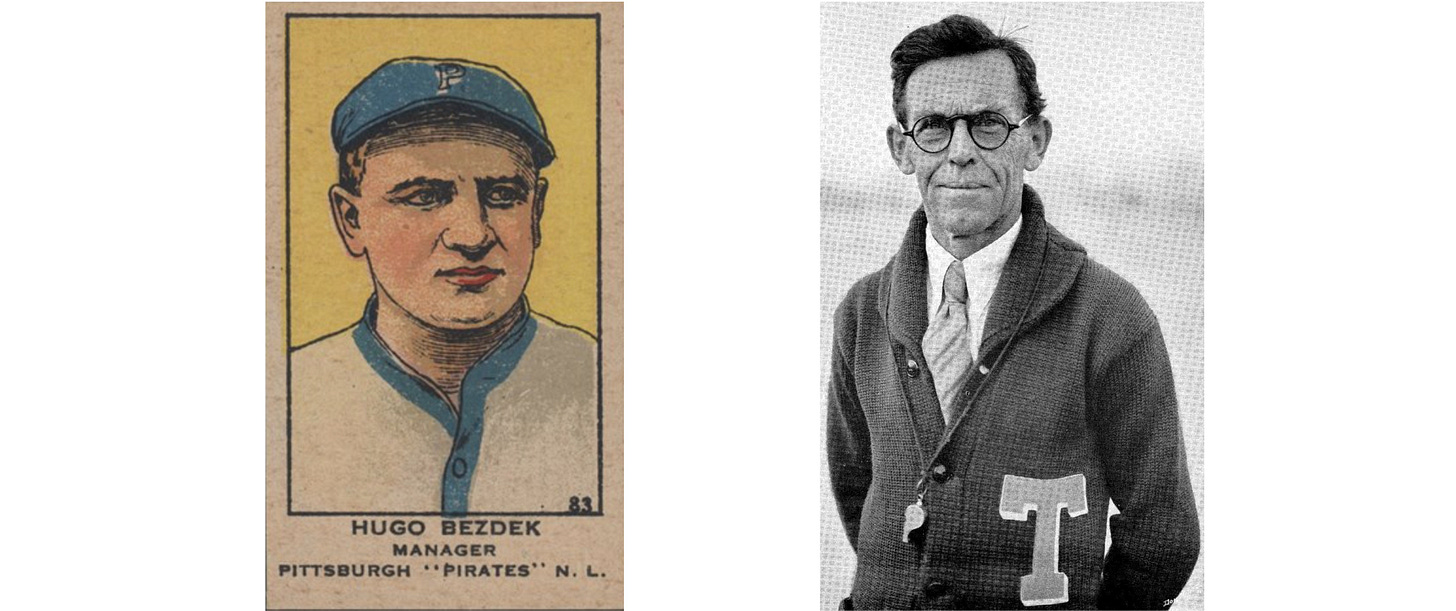December 29, 1917: 1918 Rose Bowl Coaches
Then as now, some coaches love the limelight and showcase themselves to the press, while others are suspicious of the fourth estate and grudgingly answer reporters’ questions. Hugo Bezdek, the Mare Island coach, was happy to spin a few yarns with the press. He was Oregon’s football and basketball coach, as well as the manager of the National League’s Pittsburgh Pirates in 1917.
Bezdek had coached several Mare Island players the year before at Oregon and spent one of Oregon’s bye weeks during the 1917 season working with Mare Island. John Beckett, the Marine’s player-coach during the regular season, asked Bezdek to coach the Marines in the 1918 Rose Bowl. By doing so, Bezdek later became the only man to coach three different teams in the Rose Bowl (Oregon 1917, Camp Lewis 1918, and Penn State 1923) and is also the only individual to manage a major league baseball team and be a head coach in the NFL.
The opposing and opposite coach, Lt. William “Fox” Stanton. Stanton served in the Army during the Spanish-American War and coached college football at Pomona and Occidental before WWI. When war came, he reenlisted and was a full-fledged Army officer serving with the 316th Supply Train of the 91st Division, while coaching the Camp Lewis team in his spare time. Like many of the players on the Camp Lewis team, Stanton would be with the 91st Division later in 1918 when the division engaged in battle in France and Belgium. After the war, he spent two decades coaching at Cal Tech.
Perhaps it was his disposition or the brighter than usual lights, but Stanton kept his thoughts and Camp Lewis’ workouts under wraps whenever reporters were nearby. To gain insight, some reporters resorted to sneaking under the bleachers to watch Camp Lewis practice as they prepared for the 1918 Rose Bowl.
The consensus favored the Marines in the game, in large part because they beat Camp Lewis 13-0 when the teams met seven weeks earlier. At that point, Mare Island was playing its sixth game of the season, while it was the second game of the season for the Camp Lewis all-star team. Individual units at Camp Lewis played independently early in the season and the all-star had come together shortly before the game with Mare Island. Having played together the remainder of the season, Camp Lewis was better prepared to take on the Marines in the Rose Bowl.
Much was made in the press over the size and style differences between the two teams. Mare Island’s linemen averaged 188 pounds, slightly heavier than Camp Lewis’, while the Marine backfield averaged 171 pounds per man, a ten-pound advantage over the Camp Lewis. But Camp Lewis was thought to have the faster backfield and was expected to use sweeps and the passing game to overcome Mare Island’s size advantage. That approach fit Stanton’s coaching style as well.
Of course, this was just talk (or print) as the issue would be settled when the New Year dawned on Pasadena.
Click here for options on how to support this site beyond a free subscription.



So Bezdek could, conceivably be enshrined at the Baseball Hall Of Fame in Cooperstown, New York and the Pro Football Hall of Fame in Canton, Ohio.